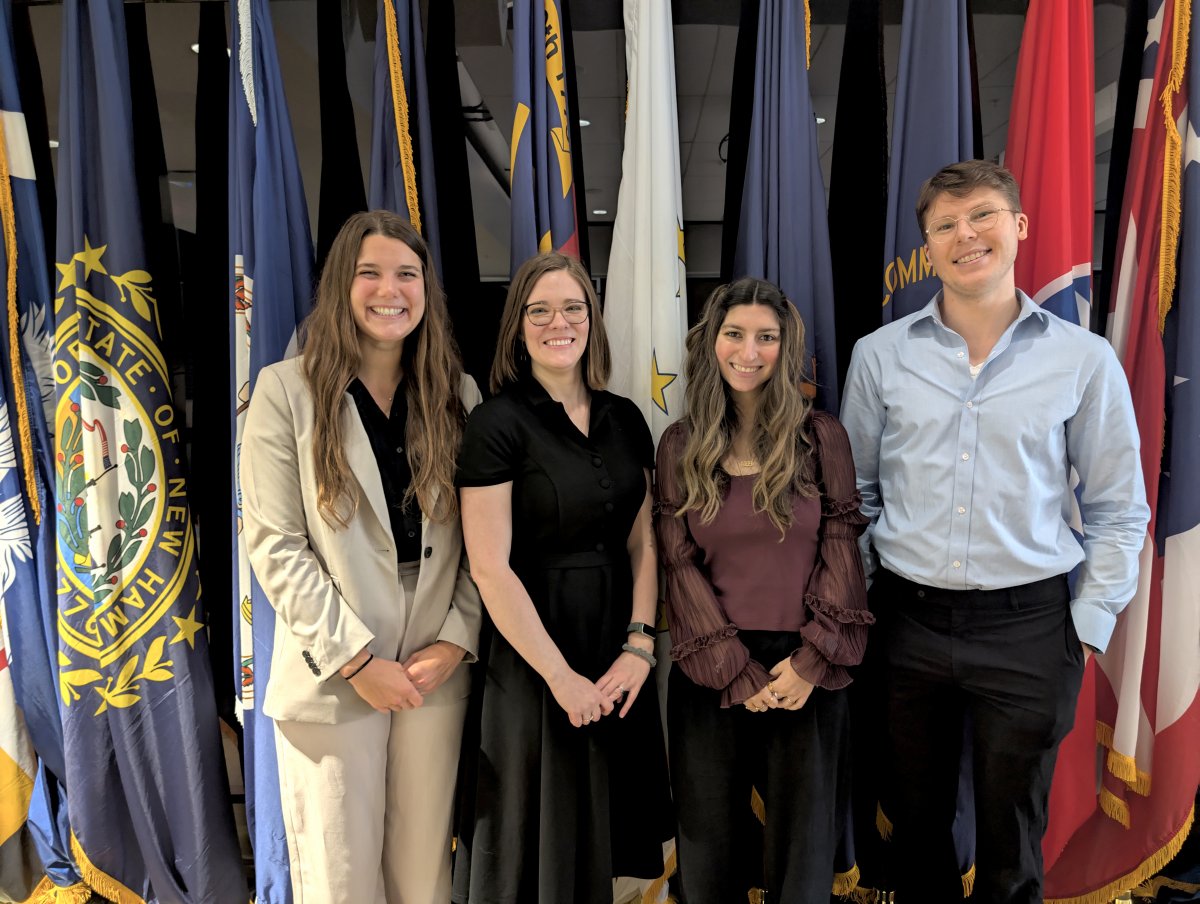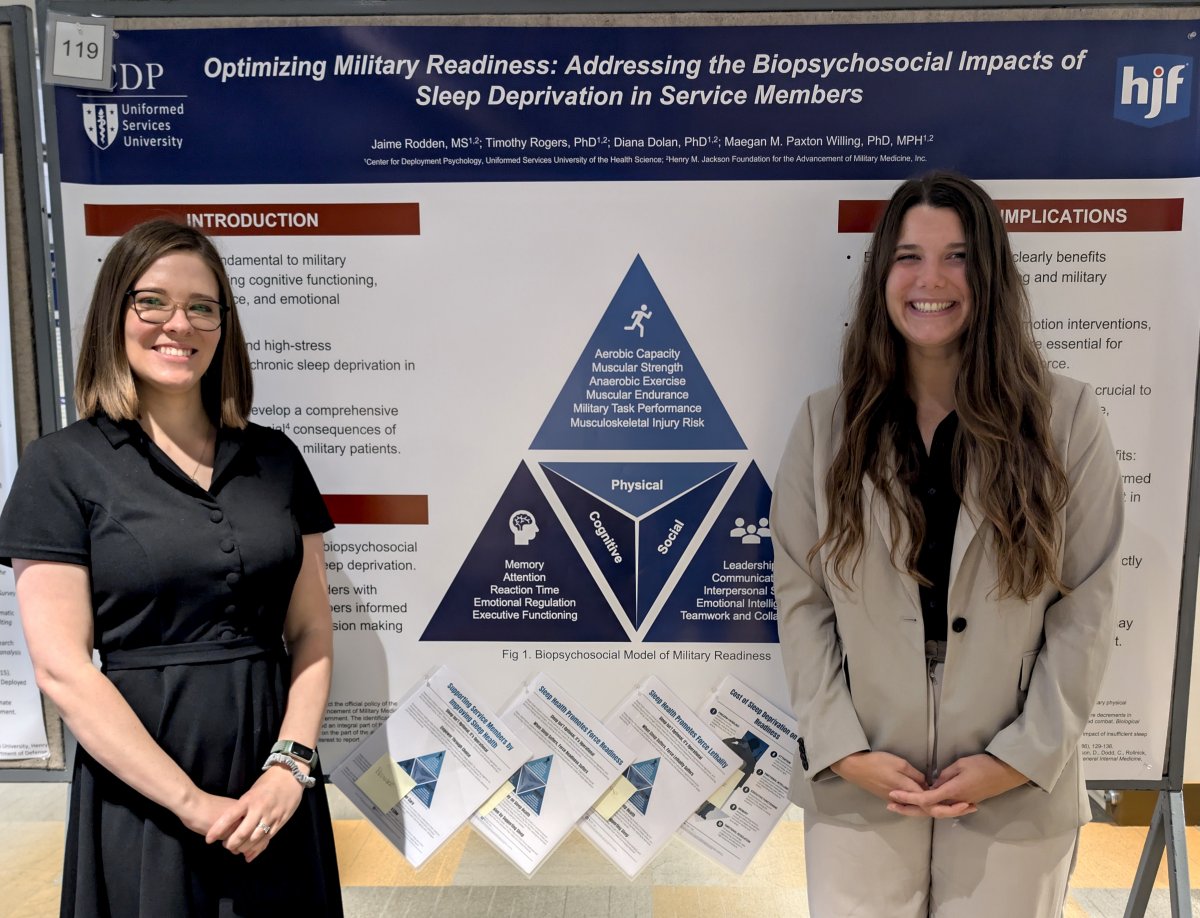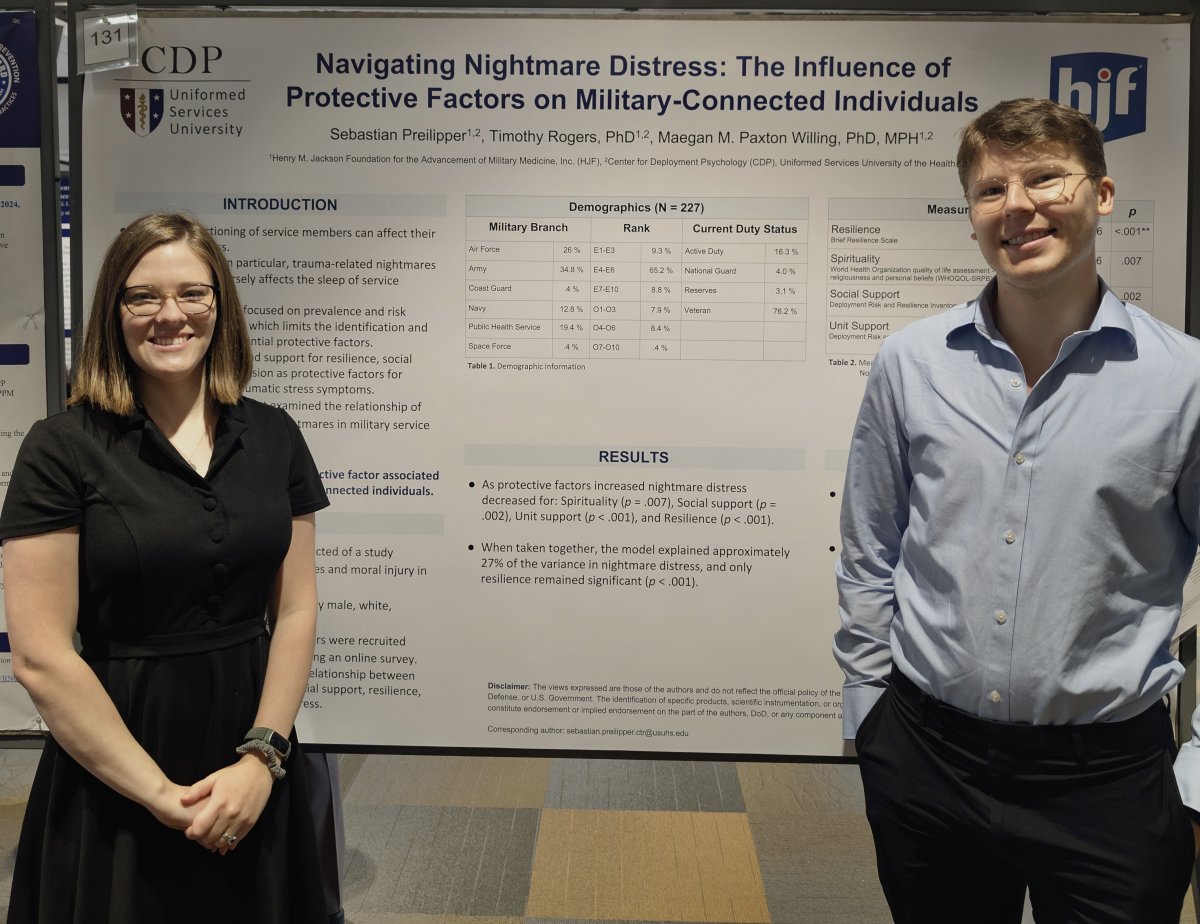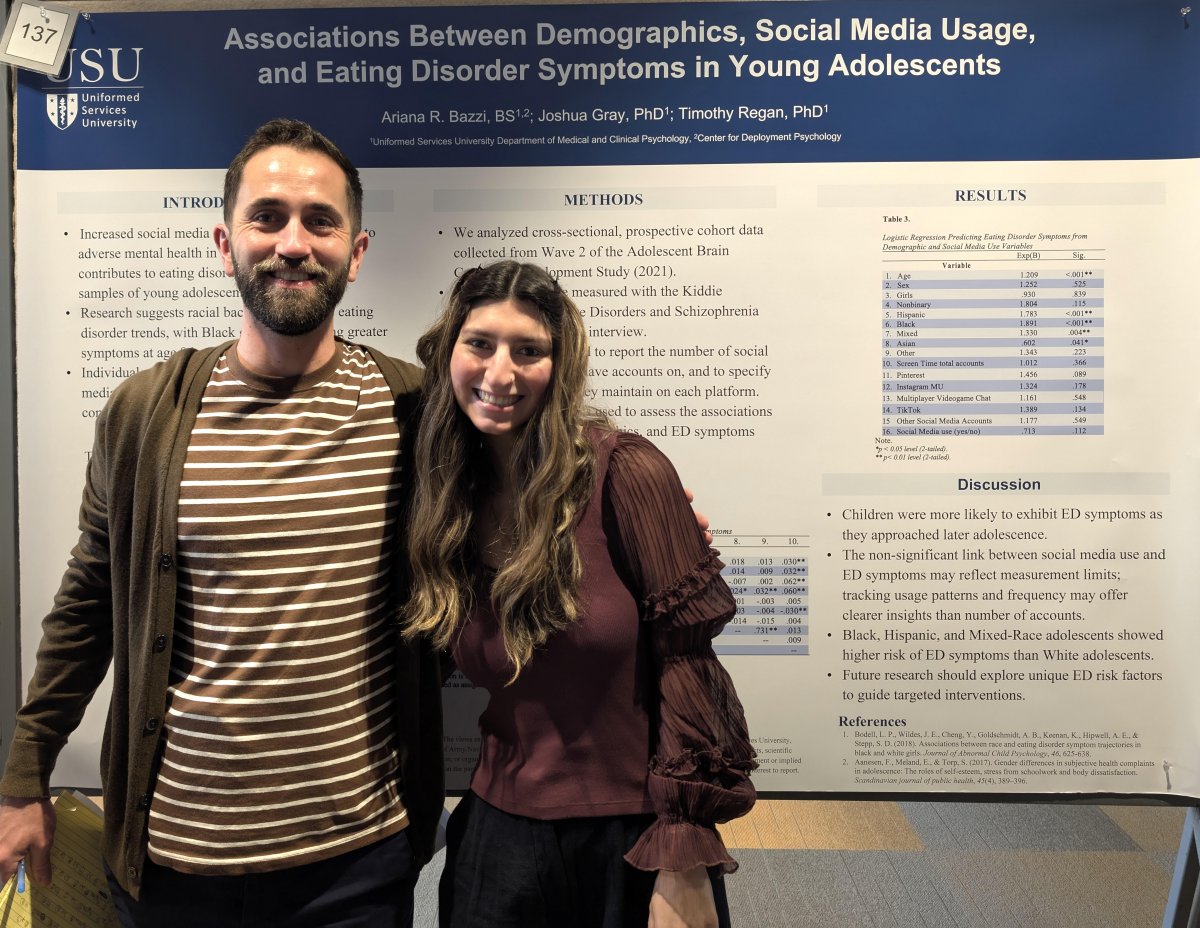Research at CDP: 2025 USU Research Day
By Jaime Rodden, Sebastian Preilipper, Ariana Bazzi & Maegan Willing
Members of the CDP Research Team, including Jaime Rodden, Sebastian Preilipper, Ariana Bazzi, and Dr. Maegan Willing enjoyed participating in the 2025 USU Research Day. This annual event at the Uniformed Services University serves as a vital platform to promote and highlight the diverse research conducted by students, postdoctoral fellows, and research associates across USU and its affiliate institutions. The posters presented by the CDP Research Team addressed important topics including eating disorders and social media use in adolescents and sleep within military populations.
Additionally, Dr. Willing supported USU’s clinical psychology students on three posters examining spirituality in survivors of military sexual trauma (1LT Cheyenne Quilter & 1LT(P) Guadalupe Rivera), attitudes towards artificial intelligence in psychotherapy (1LT John Ray Roberts), and sex differences in the effects of posttraumatic stress symptoms on relationship satisfaction in married military-connected individuals (1LT Deanna Guzman).

CDP Research Team Members: Jaime Rodden, Dr. Maegan Willing, Ariana Bazzi, and Sebastian Preilipper
Optimizing Military Readiness: Addressing the Biopsychosocial Impacts of Sleep Deprivation in Service Members
By Jaime Rodden, Dr. Tim Rogers, Dr. Diana Dolan, and Dr. Maegan Paxton Willing
Adequate sleep is crucial for military readiness, affecting cognitive, physical, and emotional well-being. However, many service members experience chronic sleep deprivation. This project included an extensive literature review of the biopsychosocial impacts of sleep deprivation and highlighted a clear connection between better sleep and improved readiness. To educate service members about the importance of sleep, the implementation of a shared decision-making model was described and encouraged. Furthermore, four infographics were developed as a resource for service members, behavioral health providers, and leadership, highlighting the negative consequences of sleep deprivation and encouraging service members to seek solutions for improved combat readiness and well-being.

Dr. Maegan Willing and Jaime Rodden
Navigating Nightmare Distress: The Influence of Protective Factors on Military-Connected Individuals
By Sebastian Preilipper, Dr. Tim Rogers and Dr. Maegan Paxton Willing
The goal of this project was to identify protective factors associated with nightmare distress in military-connected individuals. A secondary data analysis was conducted on service members (N = 227) and found that nightmare distress was lower in individuals with greater spirituality, social support, unit support, and resilience. These results suggest the need for more research into protective factors as a possible means to inform management strategies for nightmare distress.

Dr. Maegan Willing and Sebatian Preilipper
Associations Between Demographics, Social Media Usage, and Eating Disorder Symptoms in Young Adolescents
By Ariana Bazzi, Dr. Joshua Gray and Dr. Tim Regan
This project explored the relationship between social media and eating disorder symptoms in young adolescents using data from the Adolescent Brain Cognitive Development Study (n =10,973; Mean age= 11.6 years). Although neither the number of social media accounts nor the specific platforms showed a direct relationship to eating disorder symptoms, the data showed that older age and identifying as Black, Hispanic, or Mixed Race were associated with a higher likelihood of eating disorder symptoms. However, Asian adolescents were less likely to report eating disorder symptoms compared to White adolescents. These findings highlight the need for future research to understand the unique risk factors for eating disorders within these groups and how social media’s impact might differ across developmental stages.

Dr. Tim Regan and Ariana Bazzi
The opinions in CDP Staff Perspective blogs are solely those of the author and do not necessarily reflect the opinion of the Uniformed Services University of the Health Science or the Department of Defense.
By Jaime Rodden, Sebastian Preilipper, Ariana Bazzi & Maegan Willing
Members of the CDP Research Team, including Jaime Rodden, Sebastian Preilipper, Ariana Bazzi, and Dr. Maegan Willing enjoyed participating in the 2025 USU Research Day. This annual event at the Uniformed Services University serves as a vital platform to promote and highlight the diverse research conducted by students, postdoctoral fellows, and research associates across USU and its affiliate institutions. The posters presented by the CDP Research Team addressed important topics including eating disorders and social media use in adolescents and sleep within military populations.
Additionally, Dr. Willing supported USU’s clinical psychology students on three posters examining spirituality in survivors of military sexual trauma (1LT Cheyenne Quilter & 1LT(P) Guadalupe Rivera), attitudes towards artificial intelligence in psychotherapy (1LT John Ray Roberts), and sex differences in the effects of posttraumatic stress symptoms on relationship satisfaction in married military-connected individuals (1LT Deanna Guzman).

CDP Research Team Members: Jaime Rodden, Dr. Maegan Willing, Ariana Bazzi, and Sebastian Preilipper
Optimizing Military Readiness: Addressing the Biopsychosocial Impacts of Sleep Deprivation in Service Members
By Jaime Rodden, Dr. Tim Rogers, Dr. Diana Dolan, and Dr. Maegan Paxton Willing
Adequate sleep is crucial for military readiness, affecting cognitive, physical, and emotional well-being. However, many service members experience chronic sleep deprivation. This project included an extensive literature review of the biopsychosocial impacts of sleep deprivation and highlighted a clear connection between better sleep and improved readiness. To educate service members about the importance of sleep, the implementation of a shared decision-making model was described and encouraged. Furthermore, four infographics were developed as a resource for service members, behavioral health providers, and leadership, highlighting the negative consequences of sleep deprivation and encouraging service members to seek solutions for improved combat readiness and well-being.

Dr. Maegan Willing and Jaime Rodden
Navigating Nightmare Distress: The Influence of Protective Factors on Military-Connected Individuals
By Sebastian Preilipper, Dr. Tim Rogers and Dr. Maegan Paxton Willing
The goal of this project was to identify protective factors associated with nightmare distress in military-connected individuals. A secondary data analysis was conducted on service members (N = 227) and found that nightmare distress was lower in individuals with greater spirituality, social support, unit support, and resilience. These results suggest the need for more research into protective factors as a possible means to inform management strategies for nightmare distress.

Dr. Maegan Willing and Sebatian Preilipper
Associations Between Demographics, Social Media Usage, and Eating Disorder Symptoms in Young Adolescents
By Ariana Bazzi, Dr. Joshua Gray and Dr. Tim Regan
This project explored the relationship between social media and eating disorder symptoms in young adolescents using data from the Adolescent Brain Cognitive Development Study (n =10,973; Mean age= 11.6 years). Although neither the number of social media accounts nor the specific platforms showed a direct relationship to eating disorder symptoms, the data showed that older age and identifying as Black, Hispanic, or Mixed Race were associated with a higher likelihood of eating disorder symptoms. However, Asian adolescents were less likely to report eating disorder symptoms compared to White adolescents. These findings highlight the need for future research to understand the unique risk factors for eating disorders within these groups and how social media’s impact might differ across developmental stages.

Dr. Tim Regan and Ariana Bazzi
The opinions in CDP Staff Perspective blogs are solely those of the author and do not necessarily reflect the opinion of the Uniformed Services University of the Health Science or the Department of Defense.
